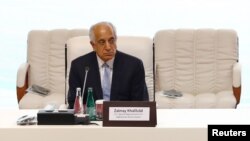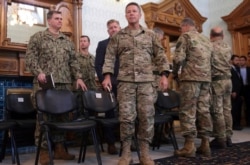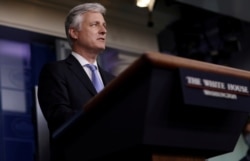The U.S. peace envoy for Afghanistan reconciliation has resumed his diplomatic efforts to press warring Afghan parties to reduce battlefield hostilities and accelerate ongoing negotiations to reach a deal that ends the country’s nearly 20-year war.
Zalmay Khalilzad’s renewed push comes as President Donald Trump’s administration says it has brought down the U.S. military presence in the war-ravaged country to 4,500 troops.
Khalilzad returned this week to Doha, Qatar, where teams representing the Afghan government and the Taliban insurgency have been negotiating since September 12. They have not made headway because of lingering disputes over procedural matters.
A spokesman for the Taliban, Mohammad Naeem Wardak, said Thursday that their political leaders in Doha met with Khalilzad and his team the previous evening, and that the commander of U.S. forces in Afghanistan, General Scott Miller, also attended.
On the agenda
Wardak said the two sides discussed “the importance and full implementation” of the peace agreement signed by the Taliban and the U.S. in February. Wardak added that the removal of names of top Taliban leaders from a U.N. so-called blacklist and alleged U.S. violations of the agreement also were discussed.
The U.S. side has so far not commented on the meeting.
The February 29 peace pact called for all American and NATO forces to leave Afghanistan by May 2021. In return, the insurgents are required to fight terrorism on Afghan soil and open peace talks with Kabul to negotiate a comprehensive cease-fire, as well as a political power-sharing deal.
White House national security adviser Robert O’Brien said Wednesday that the peace agreement sealed after 19 years of war “we hope and expect” has put Afghans “on a path toward lasting peace.” He credited Trump's working to end America’s longest war.
“We are ending the American involvement in Afghanistan. It does not take place overnight, but if you look at Afghanistan, where we had 15,000 troops, we are now down to 4,500 troops,” O’Brien said while delivering a public talk at Washington’s Hudson Institute.
“We are on a pathway to get our soldiers, sailors and Marines home after the tremendous sacrifices of blood and treasure that the country has made over the past 19 years,” he said.
While explaining a recent tweet by Trump that he wanted all American troops out of Afghanistan by Christmas, the national security adviser said that “as soon as conditions permit,” the president has pledged to live up to his commitment.
“He’s even tweeted recently like many other past presidents in times of war that he would like them home by Christmas, and whether we get them home by Christmas, or surely thereafter, American troops are coming home,” O’Brien emphasized.
Some skepticism
Critics are skeptical, however, about whether the intra-Afghan peace negotiations will produce any tangible outcomes soon or help reduce the deadly violence in Afghanistan.
Expressing his frustration over the rise in violence and the slow movement of the peace talks, Khalilzad criticized the Afghan rivals Tuesday for their “intransigence and a refusal to abandon animosity” in favor of a formula for political cooperation to end the war.
“I return to the region disappointed that despite commitments to lower violence, it has not happened. The window to achieve a political settlement will not stay open forever,” said Khalilzad. The Afghan-born diplomat urged both negotiating teams to "move past procedure and into substantive negotiations."
The United Nations warned Tuesday that the Afghan peace process had failed to slow the number of civilian casualties in the conflict. It said nearly 6,500 Afghan civilians had been killed and wounded in the country since the start of 2020, although the figures represented a 30 percent drop compared with the same period last year.






